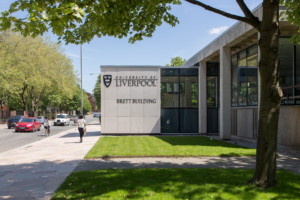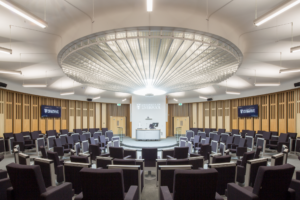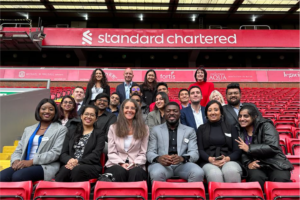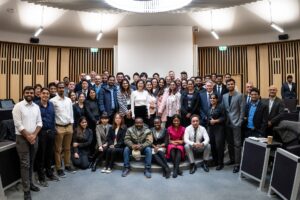How you'll learn
You’ll study your MBA in a dedicated, purpose-built teaching space, the Brett Building. Its facilities include state-of-the-art audio visual equipment, a lecture theatre, break-out spaces, and social zones.
Through your studies you will explore how business challenges can be addressed by considering real case studies of international organisations. Virtual business simulation exercises will ask you to make strategic financial, marketing and HR decisions as a team. You will interpret the stock market and other relevant information, and assess the real time impact of your choices on business performance. You’ll also have the opportunity to tackle real crisis management scenarios, through participation in action learning sets, formulating new business proposals and presenting solutions to senior business leaders. You will have access to personalised learning support which covers study skills and English language skills. Academic advice and mentoring is provided by your Academic Advisor and the alumni network.
How you're assessed
In semester one and two, you will take modules totalling 120 credits. The dissertation or consultancy based project completed during the summer period is worth 60 credits and you will be supported by your academic supervisor and the alumni network.
Students are required to complete 180 credits to achieve a full MBA.
Subject to meeting specific criteria outlined by the University, you will graduate with a Pass, Merit or Distinction.
Assessment tasks are varied and some may be designed specifically to meet the learning outcomes of a particular programme of study. However, you can expect to be assessed via coursework, essay, group work, presentations, case studies, negotiation exercises, reports and examinations. The weighting of individual components will vary from one module to another. All assessment information is included within the module specification.
Liverpool Hallmarks
We have a distinctive approach to education, the Liverpool Curriculum Framework, which focuses on research-connected teaching, active learning, and authentic assessment to ensure our students graduate as digitally fluent and confident global citizens.
The Liverpool Curriculum framework sets out our distinctive approach to education. Our teaching staff support our students to develop academic knowledge, skills, and understanding alongside our graduate attributes:
- Digital fluency
- Confidence
- Global citizenship
Our curriculum is characterised by the three Liverpool Hallmarks:
- Research-connected teaching
- Active learning
- Authentic assessment
All this is underpinned by our core value of inclusivity and commitment to providing a curriculum that is accessible to all students.











